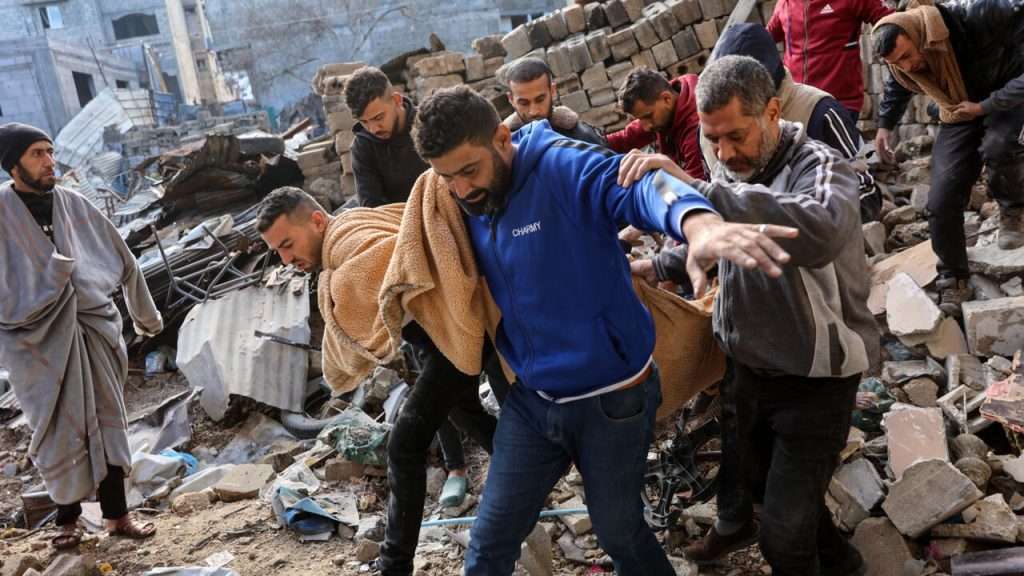45 dead in Gaza as Israel reimposes ceasefire

Israel announced on October 19th that it had reimposed the Gaza ceasefire following a series of lethal airstrikes that killed at least 45 Palestinians, marking the most serious escalation since the nine-day-old ceasefire as reported by The New Arab via AFP.
According to Gaza’s civil defence agency, the Israeli bombardment left 45 dead and scores wounded. Four hospitals confirmed to AFP that they had received both the deceased and the wounded. The Israeli military said it was “looking into the reports of casualties”.
In a statement, the Israeli army claimed that the strikes were carried out in response to what it called a “blatant violation” of the ceasefire by Hamas. “Based on directives from the political leadership, and after a series of decisive strikes in response to Hamas violations, we have begun re-implementing the ceasefire,” it declared, pledging to “respond firmly to any violation of it.”
The army further alleged that Palestinian fighters had fired anti-tank missiles and opened fire on Israeli forces operating in Rafah, prompting retaliatory strikes by “fighter jets and artillery.” Hamas denied involvement, accusing Israel of fabricating “flimsy pretexts” to resume hostilities.
Witnesses in Rafah reported renewed clashes in areas still under what they described as illegal Israeli control — a claim supported by earlier evidence of Israeli forces killing seven Palestinians, breaching the Gaza ceasefire, that had raised alarms over the truce’s durability.

Abdullah Abu Hasanin, a resident of al-Bureij camp in central Gaza, said: “The situation is as if the war has returned anew. We had hoped the agreement would hold, but the occupation [Israel] respects nothing — not an agreement, not anything.”
The raids included a strike on a shelter in Gaza City in which 11 members of the same family were killed. Hamas said that Israeli forces had continued to breach the truce since it took effect on October 1oth. On October 19th, Hamas reaffirmed that it “remains committed to the ceasefire and is implementing its terms with full precision and responsibility.”
That night, Gaza’s Media Office reported that Israeli forces had conducted at least 80 violations since the truce started, killing 97 people and injuring 230. The office defined the actions as “flagrant and clear violations of the ceasefire decision and the rules of international humanitarian law,” and noted that incidents were recorded “in all governorates of Gaza without exception.”
Israel’s handling of the ceasefire — and humanitarian access — has triggered internal turmoil. Israeli National Security Minister Itamar Ben-Gvir denounced what he termed “a shameful backdown” by Prime Minister Benjamin Netanyahu after the government went back on its decision to suspend aid to Gaza.
“We must stop this idea and return to violent fighting as soon as possible — manoeuvres, invasion, and encouragement of emigration,” Ben-Gvir said.
According to Israel’s Channel 12, the government’s reversal followed pressure from the US. A message from the US to Israel reportedly read: “You may respond to violations, but without undermining the agreement.” Meanwhile, the United Nations is pressing Israel for more aid access.
Hamas’s armed wing, the Izz ad-Din al-Qassam Brigades said it had “no knowledge of any incidents or clashes taking place in Rafah,” reaffirming its “full commitment to implementing the ceasefire agreement.”
The current ceasefire, brokered in Sharm el-Sheikh on October 9th under Trump’s plan, was designed to end more than two years of devastating conflict between Israel and Hamas. Observers have pointed out that this accords with a pattern of temporary truces repeatedly undermined by violence and political fractures.
Humanitarian organisations have warned that repeated violations could push Gaza further into catastrophe: the enclave’s aid delivery has allegedly seen progress but remains under threat from renewed strikes.
The renewed violence also underscores the widening rift amongst Israeli officials, where hard-liners push for escalation while others warn that ongoing aggression may provoke international condemnation and legal consequences.
With both sides accusing each other of violating the truce and Washington’s muted response drawing criticism from Arab and European observers, the ceasefire appears more precarious than ever.
The New Arab via AFP, The Maghrebi.org
Want to chase the pulse of North Africa?
Subscribe to receive our FREE weekly PDF magazine














